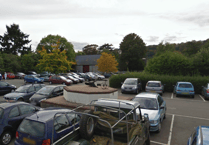A hospital building where thousands of expectant mums and their pre-born babies were cared for is set to be bulldozed to make way for a new radiotherapy centre.
As revealed in the Chronicle last month, a pre-planning consultation is currently underway on the proposed two storey cancer treatment facility at Abergavenny’s Nevill Hall Hospital.
But planners have now given approval for the 50-year-old single storey ante-natal building to be demolished to make way for the new cancer unit, with the pregnancy services relocated to another part of the hospital.
Several trees will also need to be cut down to make way for the satellite radiotherapy centre, with the demolition expected to take some 20 weeks.
A Monmouthshire Council planning officer’s report said: “The demolished building will be replaced by a new two-storey radiotherapy unit which will be the subject of a separate planning application.
“Any landscaping that has to be removed as part of the demolition works will be replaced/mitigated by new soft landscaping that will form part of the application for the new radiotherapy building…
“A full asbestos survey will need to be undertaken and any asbestos material found will be safely removed.
“For health and safety purposes, a full segregation area around the building to be demolished will be erected using site hoarding including directional signage…
“It will also be ensured that dust noise and vibration monitoring is in place prior to mechanical works being undertaken.”
The new 3,000sqm radiotherapy centre will provide cancer treatment closer to home for patients.
The project is a joint venture between Aneurin Bevan University Health Board and Velindre University NHS Trust, with the proposal aiming to provide additional and more accessible radiotherapy services for residents of Gwent and South Powys.
It will be an extension to the existing hospital buildings, but a planning statement says it will have its own “distinct identity” and a dedicated entrance.
A courtyard garden, providing views out and a place to sit and enjoy nature, will act as “a focal point” of the proposal.
Treatment facilities will be situated on the ground floor, while staff facilities such as offices, workshops and rest facilities will be on the first floor.
The centre will also be “as carbon neutral as possible” and will include solar panels on the roof.
Most cancer patients currently have to travel to the Velindre hospital in Cardiff for radiotherapy.
The development also includes re-aligned access for ambulance as well as a new car park overspill area, providing 74 car parking spaces for hospital users, and a new transformer substation.





Comments
This article has no comments yet. Be the first to leave a comment.